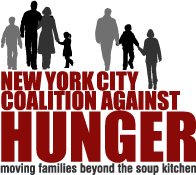A special post from NYCCAH Executive Director Joel Berg:
Last year, at an annual anti-hunger conference in DC, I asked U.S. Secretary of Agriculture Mike Johanns (a member of President's Bush cabinet) why the President was supporting ever-more tax cuts for the mega-rich while poverty and hunger in America soared. He responded that I didn't understand economics and that tax cuts fueled economic growth so much that they reduced the deficit.
But most interestingly, when USDA released the transcript of the exchange to the media, my comments were mis-transcribed in a way that may have given the impression that I supported the Bush tax cuts. Given that I talk fast and was not using a microphone, it is possible that the mis-transcription was an honest mistake on the part of the transcription service hired by USDA.
At this year's conference, I tried a different tact, attempting to ask Johanns a question which I guessed (correctly, as it turns out) that he wouldn't really be able to answer.
Some background: in New York State and three other large states (Texas, California, and Arizona), people have to be finger-printed in order to obtain food stamps. In other words, people are treated like criminals for the crime of being poor.
It is not coincidental that people never have to be finger-printed to obtain other types of USDA aid that goes to less poor (and sometimes even rich) people such as farm subsidies, money to ranchers for conservation programs, and payments to rural businesspeople. Given that those other programs have plenty of fraud, the double-standard for food stamps proves that finger-printing food stamps applicants is more about dehumanizing poor people than it is about a legitimate attempt to reduce fraud equally in all government programs.
So a few days ago at the same annual conference, after Johanns spoke, I rushed to the microphone to ask him the following question:
"Would you support finger-printing farmers, ranchers, and rural businesspeople in order for them to obtain USDA benefits? Assuming that your answer is 'no,' would you support ending the practice in which people are finger-printed in order to get food stamps, especially considering that the other benefits can be hundreds of thousands of dollars and food stamps equal only about one dollar per meal?"
Johanns was obviously at a loss for a response, and it seemed as though he didn't even know that people were finger-printed to get food stamps, even though the Food Stamp program constitutes more than a third of his entire budget, and even though the issue of finger-printing food stamps applicants has been a big political issue and media issue in New York, California, and elsewhere.
He said that, of course, I was correct that he wouldn't support finger-printing farmers, ranchers, and rural businesspeople, and that he would "look into" whether food stamp applicants should be finger-printed. It spoke volumes that the Secretary wasn't even familiar with the issue.
A USDA budget staffer traveling with him was mad at me that that I even made the comparison, saying the programs were entirely different. I responded that his reaction was exactly the point: USDA gets mad at even the notion that you'd treat generally higher-income program users (the vast majority of whom rural and white) as badly as you'd treat low-income food stamps applicants (many of whom are urban and non-white).
I must say I still have a bit of a glow about me having had the rare opportunity to challenge a high-ranking Bush official in a public forum.
Other conference participants also let Johanns have it. They slammed the Administration's proposal to entirely eliminate the Commodity Supplemental Food Program, which gives extra food to hundreds of thousands of low-income senior citizens. They opposed the President's plans to slash food stamps and make it more difficult for food banks to distribute commodities. But this year, the official USDA transcript of Johann's remarks entirely omitted the question and answer session.
I don't know which is worse: Mis-transcribing the criticisms last year or entirely leaving them off this year.
Providing news and commentary on issues facing the City's anti-hunger community

The New York City Coalition Against Hunger represents New York City’s over 1,200 soup kitchens and food pantries and the 1.3 million low income New Yorkers who are forced to use them. The Coalition works to meet the immediate food needs of low-income New Yorkers and enact innovative solutions to help them move “beyond the soup kitchen” to self-sufficiency.
Blog Archive
-
▼
2007
(102)
-
▼
March
(10)
- Mayor Announces New Anti-Poverty Pilot Program
- NYCCAH Featured
- How to Solve NYC's Growing Hunger Problem
- Welfare at 43-year low
- Assembly Proposes Even Larger Funding Hike for Fee...
- As with Mayor Bloomberg's plan to boost New York C...
- 2 out of 3...
- Food Deserts
- Few Take Advantage of the Food Stamp Program
- Advocates confront Sec. Johanns at Annual Conference
-
▼
March
(10)
No comments:
Post a Comment